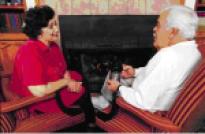Comments under factual articles in the media, “warnings” to those interested in exploring a reverse mortgage, and even research says people are afraid of reverse mortgages because they think they are a scam.
 Most people have, or had, a conventional mortgage using them to purchase their home or have refinanced their original purchase mortgage…these aren’t considered a scam. So why are reverse mortgages considered a scam?
Most people have, or had, a conventional mortgage using them to purchase their home or have refinanced their original purchase mortgage…these aren’t considered a scam. So why are reverse mortgages considered a scam?
A reverse mortgage is a loan to a homeowner using the home as collateral or security where the lender puts a lien against the property, just like conventional mortgage, but with special terms for those 62 and older.
The Home Equity Conversion Mortgage or HECM, the most common reverse mortgage, is insured by FHA for the purpose of providing a valuable financing alternative for senior homeowners to help them remain in their home and have access to funds by withdrawing a portion of their home equity.
Whether a conventional mortgage or a reverse mortgage, borrowers are responsible on how they use the funds from their loan. If not used wisely, with a conventional mortgage the borrower is said to be irresponsible; with a reverse mortgage it is said the lender took advantage of the borrower and it’s a scam. Why? It is the borrower who is making the choices.
Let’s compare the two.
| Reverse Mortgage | Conventional Mortgage | |
| Loan Collateral | It is a loan using the home as collateral. | It is a loan using the home as collateral. |
| Title/Ownership | The title stays in the borrower’s name, they remain the homeowner. | The title stays in the borrower’s name, they remain the homeowner. |
| Interest Rate
|
Income or credit scores don’t affect the interest rate.
|
Interest rate can be impacted by one’s income and credit score. Limited income and poor credit means a higher interest rate. |
| Qualifying
|
One homeowner needs to be 62 or over. Income and credit history are used to for qualifying; to determine if borrowers meet HUD’s Financial Assessment requirements. If one has a history of late payments on debt and a low residual income, a Life Expectancy Set Aside may be necessary. Under some circumstances they may not qualify. These requirements are lower and less strict than a traditional loan. | Income and credit history and scores are used to for qualifying; low income and/or a poor credit may mean one doesn’t qualify for the conventional mortgage.
|
| Closing Costs
|
Closing costs generally include origination fee, appraisal, title and recording fees. Closing costs could be offset by lender or broker credits but will likely have a higher interest rate.
FHA Mortgage Insurance Premiums are charged.
Closing costs are comparable to reverse mortgages…side-by-side comparisons have been done. |
Closing costs generally include origination fee, appraisal, title and recording fees. Closing costs could be offset by lender or broker credits but will likely have a higher interest rate.
If doing a “Forward” FHA Mortgage Insurance Premiums are charged. On conventional mortgage one may be required to pay for Mortgage Insurance. Closing costs are comparable to reverse mortgages…side-by-side comparisons have been done. |
| Loan Amount Borrowed
|
Initial amount borrowed is based on the age of the youngest homeowner, appraised value or FHA Lending Limit, expected interest rate and program chosen.
Over time the amount borrowed increases with the interest amount charged, FHA Mortgage Insurance Premium and draws being added to the loan balance. At some point the amount borrowed could be more than the value of the home at the time the loan was initiated. If payments are made (they are optional), then they could decrease the loan balance. |
Amount borrowed is based on appraised value of home, credit score, income, debts, and program chosen.
|
| Receipt of Funds
|
Can receive funds as a line of credit, monthly payments to the borrower, lump sum or a combination of these.
Line of credit increases monthly so more funds become available over time. The available line of credit can never be withdrawn by the lender if borrower is abiding by the terms of the loan. |
Conventional mortgage funds are drawn as a lump sum.
Home Equity Line of Credit (HELOC) creates a line of credit for a specific term and specific amount. The line of credit does not increase and the lender can withdraw the loan at any time. |
| Use of Funds
|
Borrowers benefit by having access to funds for whatever they need or want. It can be used for more immediate needs or as a financial planning tool or even to purchase a home. | Borrowers purchase a home or refinance to have funds for what they need or want.
|
| Monthly Mortgage Payments
|
The advantage is monthly mortgage payments are not required make which takes away the risk of foreclosure from not making a monthly mortgage payment. | With a conventional mortgage or HELOC one has to make monthly mortgage payments. If the mortgage payments aren’t made, usually within 3 to 4 months, the foreclosure process will begin. |
| Payment Requirements
|
While monthly mortgage payments are not required, they can be made; it’s a choice of the borrower as to when, how much, how often, or not at all. Making payments reduces the loan balance.
With the adjustable rate, the funds are applied to the line of credit and can be re-borrowed without refinancing. |
Payments are required to be made.
One has to refinance to access more funds.
|
| Interest
|
Interest is accrued over the life of the loan. This increases the loan balance over the term of the loan.
If one chooses to make payments the loan balance will be decreased by the amount of payment(s) made. |
Interest is paid each month along with the principal generally reducing the loan balance over the term of the loan.
If one has a balloon payment the full payment would be required at the end of the loan term…generally 10 to 15 years. |
| Borrower’s Responsibilities
|
Borrowers are responsible for keeping insurance on the property, paying property taxes and maintaining the home. As long as they abide by the terms of the loan they are not forced from their home.
If they don’t abide by the terms of the loan, they risk a foreclosure. |
Borrowers are responsible for keeping insurance on the property, paying property taxes and maintaining the home. As long as they abide by the terms of the loan they are not forced from their home.
If they don’t abide by the terms of the loan, they risk a foreclosure. |
| Loan Term/Due Date
|
It is a loan and does need to be repaid at the end of the loan term. The reverse mortgage loan is not due and payable until the home is no longer the primary residence of the borrower. (Or if they don’t abide by the terms of the loan.) The due date on the mortgage is the 150th birthday of the youngest borrower. | It is a loan and does need to be repaid over the life of the loan. A conventional mortgage loan term has a due date generally in 15 or 30 years from the closing date. A HELOC’s loan term has a due date generally in 10 to 15 years from the closing date.
|
| Equity Difference When Sold
|
When the loan is being repaid, if the home is sold for more than the loan balance, the borrower or their heirs receive the difference. | When the loan is being repaid, if the home is sold for more than the loan balance, the borrower or their heirs receive the difference. |
| Non-Recourse
|
All reverse mortgages are non-recourse which means there is no personal liability to the borrower or their heirs. The loan is paid back only from the property. | Conventional loans can be non-recourse, it’s determined by the lender. Without the non-recourse factor the lender can be repaid from other assets of the borrower. |
| FHA Mortgage Insurance Premium Covers When Loan Due
|
If the loan balance is higher than what the home can be sold for when the loan is due, the FHA Mortgage Insurance covers the difference to the lender; the borrower or their heirs or tax dollars don’t cover this difference. | |
| Staying in home when all funds used
|
Once a reverse mortgage is in place, even if one draws all the funds available from the reverse mortgage, the borrowers can stay in their home as long as they abide by the terms of the loan, i.e. pay property taxes and insurance, HOA dues if applicable, and maintain the home. | Borrowers stay in their homes even when all funds are drawn as long as they abide by the terms of the loan.
|
| Protections
|
Requires counseling by a HUD approved 3rd party counselor as a protection to help borrowers understand the details of the reverse mortgage. The processing cannot start until the counseling has occurred.
HUD regulates what lenders and third-parties may charge stating they must be customary and reasonable costs necessary to close the mortgage. Mark-ups are not allowed. Disclosures and sample closing documents must be provided to borrowers at application. |
No counseling required.
Mark-ups on such items as processing and underwriting fees and courier fees can be charged.
|
| Lender/Bank and Investor Benefit
|
Lender makes money by the interest charged on the loan.
Would you loan money without receiving a benefit or compensation? |
Lender makes money by the interest charged on the loan.
Would you loan money without receiving a benefit or compensation? |
 As you can see, reverse mortgages compare to conventional mortgages and they are NOT a scam. As with any financial product, or any purchase for that matter, one should get the facts and understand the terms of what they are purchasing.
As you can see, reverse mortgages compare to conventional mortgages and they are NOT a scam. As with any financial product, or any purchase for that matter, one should get the facts and understand the terms of what they are purchasing.
The loan officer one is working with should be explaining the features and terms of the reverse mortgage. Yes, unfortunately there are bad apples in every industry but that doesn’t mean the product is bad. The reverse mortgage industry has implemented protections to prevent borrowers from scam.
Don’t jump to conclusions! Understanding them, one might find the reverse mortgage is a viable option for their situation.
For further details on the reverse mortgage contact us if you are in Minnesota. As your local broker, we work with several lenders and provide free information and facts with no obligation, meeting in person whenever possible. For other states, contact your local reverse mortgage specialist who is a broker, one who works with several lenders, has their Broker License/NMLS and preferably holds the Certified Reverse Mortgage Professional (CRMP) designation.
© 2016 Beth Paterson, CRMP, Beth’s Reverse Mortgage Blog, 651-762-9648
This material may be re-posted provided it is re-posted in its entirety and without modifications and includes the contact information, copyright information and the following link: http://wp.me/p4EUZQ-1ph
Related articles:
- Reverse Mortgage Features and Terms Summary
- Seventeen Facts About Reverse Mortgages You May Not Know
- Basics of Reverse Mortgages You Need to Know!
- You Need to Know Reverse Mortgage Borrowers Are Highly Protected!
- Do You Understand The Reverse Mortgage Closing Costs?
- Surprise! Reverse Mortgage Closing Costs Actually Compare to Conventional Mortgage Costs
- Why You Pay FHA Mortgage Insurance Premiums on Reverse Mortgages.
- Reverse Mortgage Misconceptions Continue; You Need To Get The Facts!
- Reverse Mortgage Borrowers Have Responsibilities Or They’ll Pay the Consequences
- What To Consider When Talking With Reverse Mortgage Originators
- What to expect working with Reverse Mortgage Originators: Our Pledge To Our Borrowers
- Who is REALLY responsible for reverse mortgage borrowers facing foreclosure
- Our Experiences with Getting Our Reverse Mortgage
Blog posts’ information is current as of date post published, program is subject to change in the future. Contact us for current information, 651-762-9648.
This site or the information provided is not from, or approved by, HUD, FHA, or any US Government or Agency.

 As people are preparing their taxes, I’ve been receiving the question, “Is the interest on my reverse mortgage deductible?” So let me answer this question for you.
As people are preparing their taxes, I’ve been receiving the question, “Is the interest on my reverse mortgage deductible?” So let me answer this question for you. Most seniors who do a reverse mortgage do not have a significant income tax burden therefore a tax deduction is not a large concern for them. Many borrowers feel that receiving funds for one’s needs and desires with no required monthly mortgage payments outweigh the loss of the tax deduction. They want to live comfortably, have some “elbow room,” and be independent with security, independence, dignity and control.
Most seniors who do a reverse mortgage do not have a significant income tax burden therefore a tax deduction is not a large concern for them. Many borrowers feel that receiving funds for one’s needs and desires with no required monthly mortgage payments outweigh the loss of the tax deduction. They want to live comfortably, have some “elbow room,” and be independent with security, independence, dignity and control.
 An all too common statement is that a drawback of the reverse mortgage is the hefty or high up front fees. But are they really hefty? Are the fees really a drawback?
An all too common statement is that a drawback of the reverse mortgage is the hefty or high up front fees. But are they really hefty? Are the fees really a drawback?






 Often stated, the reverse mortgage is expensive and the fee the originator makes is part of the reason. Originating reverse mortgages is not as easy as one, two, three but a very time consuming process.
Often stated, the reverse mortgage is expensive and the fee the originator makes is part of the reason. Originating reverse mortgages is not as easy as one, two, three but a very time consuming process.




 Friday I received a call from the niece of one of my Minnesota reverse mortgage clients telling me that Bob had passed away. After extending my sympathies I answered her questions and helped her understand the process now that the loan is due. As I talked with Bob’s niece she shared how loving Bob was and how the FHA Home Equity Conversion Mortgage (HECM) reverse mortgage not only benefited him but also allowed for him to create numerous memories for the family.
Friday I received a call from the niece of one of my Minnesota reverse mortgage clients telling me that Bob had passed away. After extending my sympathies I answered her questions and helped her understand the process now that the loan is due. As I talked with Bob’s niece she shared how loving Bob was and how the FHA Home Equity Conversion Mortgage (HECM) reverse mortgage not only benefited him but also allowed for him to create numerous memories for the family.